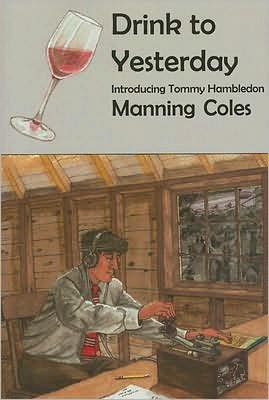Manning Coles was the pen name of Francis Oke Manning (1891-1959) and Cyril Henry Coles (1899-1965) who wrote some two dozen spy novels from 1940 to 1963, featuring Thomas Elphinstone Hambleton, a modern-language teacher turned British secret agent. Manning was a munitions worker during World War I and Coles, who enlisted as a teenager, was transferred to intelligence, and served during the Great War behind German lines as the youngest member of Britain's Foreign Intelligence Office, later MI6.
In the first of the Tommy Hambleton series, Drink to Yesterday, the hero plays a secondary role to Bill Saunders, one of Tommy's pre-war pupils. Bill is drafted (as Coles was) into the intelligence service because of his language proficiency, and is sent deep behind enemy lines. Saunders undertakes a series of daring exploits to sabotage the German war effort, including helping to disrupt a germ warfare plan and destroying a dirigible fleet destined to bomb London. All the while Tommy acts as backup for the daring Saunders. Bill escapes to England just ahead of the enemy at the novel's conclusion, but Tommy is reported missing and presumed dead.
A Toast to Tomorrow begins in the early 1930s during Hitler's first years in power. Tommy, who survives his presumed drowning in book one, is in hospital and suffering from amnesia. Recovered in body, if not mind, he gradually works his way up in the Nazi hierarchy to become Chief of Police and a member of Hitler's inner circle. As he gradually regains his memory, he realizes he is in a unique position to serve British intelligence once again--only this time from within the enemy's government. Tommy re-establishes contact with his old comrades in London through a radio play he has written that contains secret information in Morse code. As with Drink to Yesterday the narrative follows Tommy's life within the heart of enemy country, and explores the psychological tensions experienced by someone who is living a lie and always in danger of exposure and the threat of death.
This second book of the series brings together some of the same cast from the first, and it explores many of the same themes and events of the time that would go on to shape the Second World War.
The Manning Coles spy thrillers occupy a formative place in the development of the espionage novel. Coles stressed the day-to-day lives of spies, the need for secrecy even from loved ones, and the awful requirements of betrayal and death each spy must be willing to execute. His novels have an edge missing from much inter-war spy fiction before him, and his style paved the way for the sort of atmosphere that would later inform the work of John le Carr? and others. A Drink to Yesterday and A Toast to Tomorrow still read well for both their period flavor and their ripping good plots.



